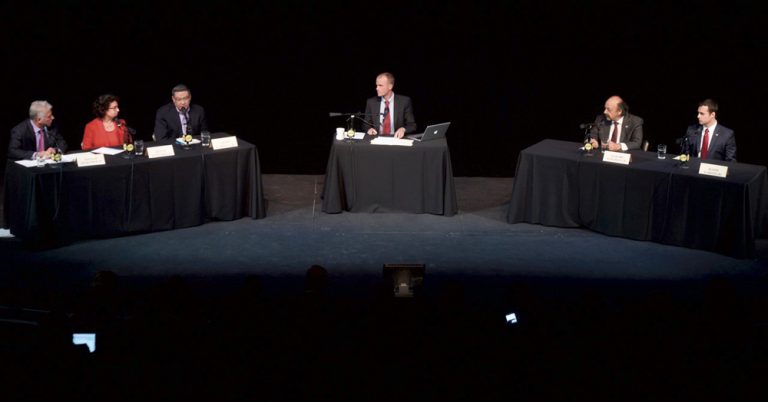
Kelsey Knorp
Contributing Writer
California’s minimum wage sparked moments of heated exchange between nearly all five 24th District candidates featured in Friday’s congressional debate, after a question posed to the panel provided political outsiders from both parties the chance to land a personal punch or two.
The radio debate aired May 6 on both the FM station and website for KCRW, which partnered with the Santa Barbara Independent to host the event’s live audience at Santa Barbara’s New Vic Theatre. Moderator Jon Bastian spent most of the hour probing for weak spots in each of the three Democratic and two Republican campaigns, and his question on state wage policy — which will raise the minimum from $10 to $15 per hour by 2022 — marked one of few intermittent breaks in this individual line of questioning.
Last to weigh in on the matter — having stayed out of the fray — was Santa Barbara Mayor and Democrat Helene Schneider, who justified California’s latest wage initiative as something of a trade-off for the public cost of government assistance that would otherwise be required to support many residents.
“Would you rather have someone who’s able to earn a living wage be able to give back and put that money back into the economy,” Schneider said, “or not making enough while they’re working full time — maybe two jobs — trying to keep their family together, and yet still have to go back to public agencies … for subsidy?”
The former city council member also highlighted the Santa Barbara Living Wage Ordinance she co-sponsored and helped pass in 2006, which compelled private companies contracted by the city to pay their workers higher wages and provide better employee care.
Fellow raise supporter Salud Carbajal, current First District supervisor for Santa Barbara County, invoked his childhood in an immigrant household living on a minimum wage salary. He claimed the impending increases will allow millions statewide to “have ladders of opportunity to pick themselves up out of poverty,” and, “get to the middle class in the near future.”
Both Republicans, California State Assemblymember Katcho Achadjian and Santa Barbara businessman Justin Fareed, pointed to a study conducted by the California Department of Finance stating its opposition to the wage hikes based on cost findings. Fareed also criticized the $15 hourly minimum for its assumption of uniform economic conditions across diverse regions, slipping in a dig at Carbajal in the process.
“I also want to point out that the supervisor’s never worked for minimum wage, and he’s been making over six figures for a very long time,” the Republican said. “So to say that you understand what that is, I think is a little bit of an afterthought.”
Carbajal did not deny the claim but called Fareed’s analysis of the wage policy “insulting” to families who stand to benefit most from the increases. “To talk about it in such theoretical ways doesn’t do justice to the plight that the residents I’ve represented and hope to represent on the Central Coast are experiencing day in and day out,” said the supervisor.
Though organic farmer and campaign finance crusader Bill Ostrander acknowledged a gap between the wage initiative’s moral benefits and its fiscal practicality, his stance on the issue favored the former. And like Fareed, he didn’t hesitate to get personal when arguing his case.
“I’d like to remind the crowd that Mr. Fareed still works for his parents,” Ostrander said of Fareed, who serves as vice president of his family’s business, ProBand, Inc.
He also addressed Achadjian, arguing that economic productivity long ago outpaced the minimum rates the assemblymember credited with putting himself through college. By Ostrander’s estimations, the $15 hourly figure is still just enough for two full-time Santa Barbara workers to cover the basic living costs of a four-person family — though he said it’s a step in the right direction.
Achadjian, who earlier in the debate defended his ownership of local gas stations and favorable position on fracking, discussed his own payroll to illustrate how the heightened wage could skew pay structures for employers. If his lowest-paid workers receive such a raise, he will be forced to proportionally increase the wages of those already paid $17 per hour “so that they feel good about what they do,” he said.
Stances given on student issues did not diverge much from March’s UCSB debate, though this time only Democrats were asked to provide them. Meanwhile, a query posed exclusively to the Republicans asked simply if they would support presumptive presidential nominee Donald Trump — earning begrudging affirmation from Achadjian and a long-winded claim to indecision by Fareed.
“I’m campaigning to represent the people of the Central Coast,” Fareed said, after Bastian interjected to ask whether the candidate would campaign for Trump. “Will I vote for him? Time will tell.”
Just weeks remain before California’s June 7 primary election, when two of the nine total candidates will move forward — regardless of party affiliations — to the general election in November.
“Unfortunately the way politics works in this country is when it comes to the general election, people are really going to focus on personal issues and on policy issues,” Schneider said in her closing statement. “I hope you can focus on what’s happening on the policy.”











Comments are closed.